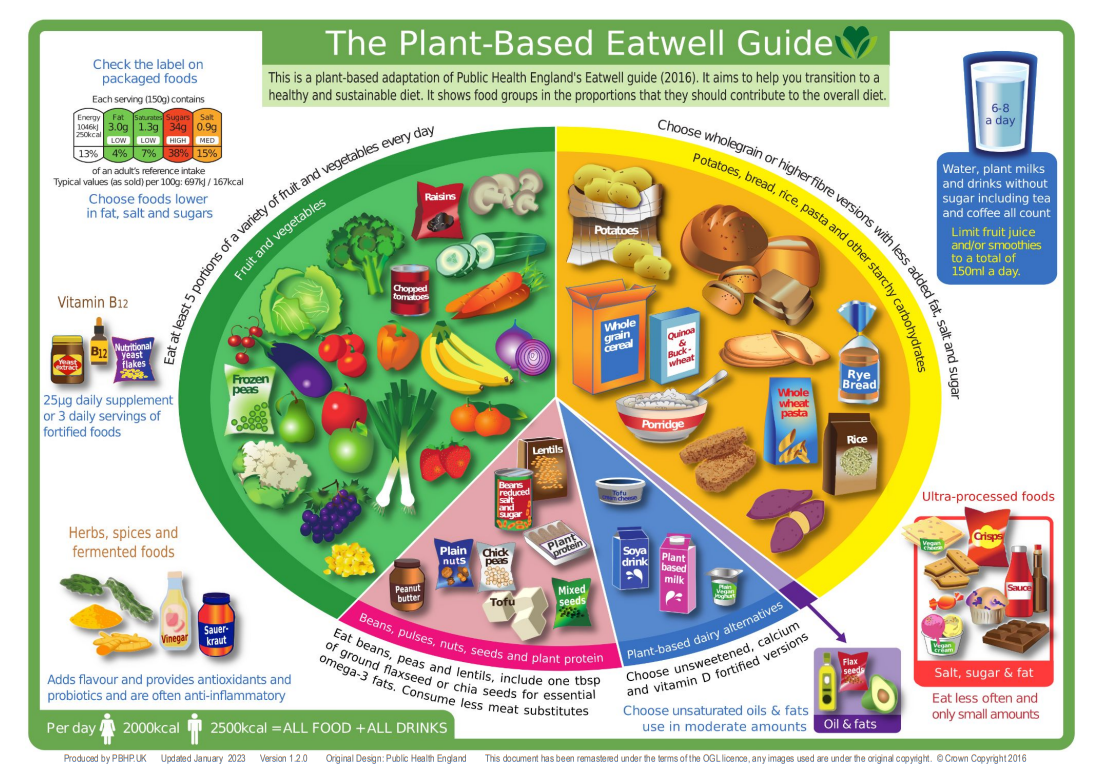By Dr Shireen Kassam and Rohini Bajekal, Plant-Based Health Professionals UK


Recently, the plant-based health professionals updated their valuable resource – the Plant-Based Eatwell Guide. We were keen to find out more and so here Dr Shireen Kassam and Rohini Bajekal share the background behind creating the resource and how it can be used in practice.
Plant-based eating
Interest in plant-based diets continues to rise for reasons related to animal justice, human and planetary health. There is strong and consistent evidence that adopting a predominantly or exclusively plant-based diet will improve population health whilst supporting the food system to keep within planetary boundaries. In recognition of these facts many country-based guidelines are considering sustainability within their guidance and as a consequence recommending that citizens drastically reduce their reliance on animal-sourced foods, instead centring their diets around fruit, vegetables whole grains, beans, nuts and seeds. One of the most progressive country-based guidelines is from Canada. Its 2019 update clearly recommends a predominantly plant-based diet (87.5% of energy intake) with at least half of protein intake from plant sources and dairy has been removed as a food group. Similarly, 2021 guidelines from Denmark clearly state, ‘Eat plant-rich’.
Recommendations supporting plant-based diets
Over the last two years, there has been recommendations for UK citizens to also favour a more plant-based diet with the National Food Strategy report recommending a rather conservative 30% reduction in meat consumption whilst increasing fruit, vegetable and fibre intake. Similarly, policy documents from the UK Government titled ‘All Our Health: personalised care and population health’ encourage health professionals to support citizens to adopt sustainable plant-rich diets and clearly state that a 100% plant based diet is nutritionally adequate and can support healthy living.
Whilst the UK’s Eatwell guide from 2016 is two-thirds plant-based with recommendations to choose protein from beans more frequently than meat, there is little specific information provided for those who may want to follow a 100% plant-based or vegan diet.
The new guide
At Plant-Based Health Professionals UK we provide education and advocacy on healthy plant-based diets for both human and planetary health. We encourage people to adopt a 100% plant-based diet, whilst recognising that any steps taken towards incorporating more plant-based foods into the diet is going to be beneficial. With this in mind, we have adapted the Eatwell Guide to one that is fully plant-based and incorporates specific information relevant to those who are not consuming any animal-derived foods. This includes information on nutrients that tend to be of lower abundance in a plant-based diet, including iodine, vitamin D and omega-3 fats and clear guidance on the need to supplement vitamin B12. We have followed the established format of the original Eatwell guide to make it easily recognisable and useable. We have added specific sections on incorporating herbs, spices, and fermented foods, choosing fortified dairy alternatives, information on supplements, healthy plant sources of fats and the need to minimise foods high in salt, sugar and saturated fat. We also highlight knowledge on the benefits of a plant-based diet for both human and planetary health. In addition to this guide, we have numerous free factsheets on our website on topics relevant to plant-based nutrition and the prevention and management of chronic conditions such as type 2 diabetes and heart disease.

Download the full PDF guide.
Also available is an A3 wallchart of the guide.
To summarise…
We hope that this provides a useful resource for those who are trying to make healthier and compassionate choices for themselves, their families and for the future of the planet. Plant-based diets are not only nutritious but can be delicious, varied, affordable and are adaptable to all traditional and cultural diet patterns.
Related MyNutriWeb Content
The Eatwell Guide – Health Professionals Call for Urgent Government Action (2022)







So interesting and helpful to see these culturally appropriate and planet-wise versions. Thanks for sharing these.
Amazing guide for healthy and sustainable plant based diet. Good to see that herbs, spices, fermented foods and B12 are also mentioned. Simple and easy to read. Very helpful to get the link to healthy food recipes at the bottom. Thank you for sharing this great resource.